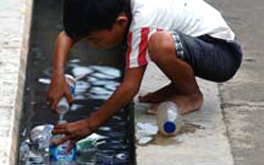Emerging Economies Climate Report 2022
The report reveals that over half of companies in emerging economies have been impacted by extreme weather events over the last 12 months.The report shows that 58% of companies in Africa and South Asia
The report reveals that over half of companies in emerging economies have been impacted by extreme weather events over the last 12 months.The report shows that 58% of companies in Africa and South Asia
One out of every eight people in the world is chronically undernourished, the United Nations' food agencies said on Tuesday, warning that progress to reduce hunger has slowed since 2007/08 when high food
Urges Supreme Court to modify order on supply to Tamil Nadu The Karnataka government on Thursday moved the Supreme Court, seeking a stay/modification of its September 28 order, which directed the State to release 9,000 cusecs of water to Tamil Nadu daily till October 15 as per the orders of the Cauvery River Authority headed by the Prime Minister. In its application, Karnataka pointed out that it had complied with the order by releasing 99,601 cusecs (from September 20 to October 3).
Genetic engineering has been hailed as a panacea for the problem of global hunger and population explosion, but research studies reveal that it has failed to deliver the goods. At the same time, it has created more problems than it could solve. The Union of Concerned Scientists, an international research group based in the US, said none of the genetically engineered crops under cultivation so far has boosted farm yield or overcome the problem of drought conditions. “Genetic engineering has actually done very little to increase the yield of food and feed crops. It appears unlikely that this technology will play a leading role in helping the world feed itself in the foreseeable future,” said the Union of Concerned Scientists. In a document — Failure to Yield — released at the CoP-11, the research group reviewed the data on soybeans and corn, the main GE food/feed crops in the USA.
New research provides the latest numbers behind ethanol’s toll on global food prices—$11.6 billion in higher prices for corn importing countries over a period of six years. More than half, $6.6 billion,

<p><span id="itro1">This new WHO report provides scientific information on the connections between weather and climate and major health challenges. These range from diseases of poverty to emergencies arising
Northern parts of the country and the Himalayan region will be the worst hit by climate change in India and warming will be greater over land than sea, according to a latest report. “In the 2020s, the projected warming is of the order of 0.5-1.5 degrees Celsius, by the 2050s, three degrees Celsius and by the 2080s, around 4 degrees Celsius. Warming will be greater over land than sea and it is projected over northern parts of the Indian landmass and over the Himalayas,” says a joint India-UK report on potential impact of climate change and adaptation in India which was launched here on Thursday.
“Due to failure of monsoon, drought had been severe affecting agriculture” Karnataka farmers have moved the Supreme Court challenging the direction given to the State by Prime Minister Manmohan Singh, as the head of the Cauvery River Authority (CRA), to release 9,000 cusecs of water to Tamil Nadu from September 20 to October 15. Suresh and three other farmers have, in a writ petition, said that this year due to failure of monsoon to the extent of 40 per cent, drought had been severe affecting half of the agricultural operations in the Cauvery basin of Karnataka.
More than 100 million people will die and global economic growth will be cut by 3.2 percent of gross domestic product (GDP) by 2030 if the world fails to tackle climate change, a report commissioned by
Further releases to be based on inflows into Kabini and Krishnarajasagar The goodwill gesture extended by Karnataka to release 10,000 cusecs of water to Tamil Nadu till September 20 has come to an end and further releases are expected to be purely based on the inflows into the Kabini and the Krishnarajasagar reservoirs, given the differences that have cropped up after a meeting of the Cauvery River Authority.
The worrying decline in inflow into the major reservoirs in the Cauvery basin has forced the Karnataka government to reject the formula suggested by the Cauvery River Authority (CRA) for sharing the river water with Tamil Nadu. To make matters worse, the south west monsoon is all set to end in the next 15 days, dampening any hopes of improvement in inflows in Harangi, Hemavathi, KRS and Kabini reservoirs in the Cauvery basin.